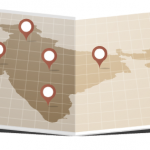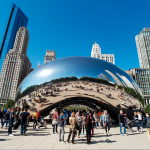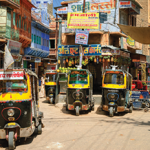New Perspectives
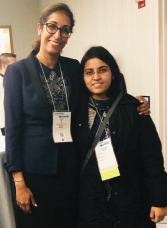
Dr. Dua (left) with Dr. Sinha at the IRA Reception during the 2018 ACR/ARHP Annual Meeting.
Through this exchange, I was able to perceive certain differences in the healthcare delivery systems between the two countries.
In India, the healthcare system varies from state to state and between the government and private sectors. I trained in a government, academic, tertiary care center.
We have rheumatology outpatient clinics on Monday, Wednesday and Friday, with an average of about 400 patients per day seen by 8–10 providers. On Tuesdays, we have lupus clinic, with about 100 to 150 patients per clinic. Our Indian lupus patients often have very aggressive disease with significant renal involvement. Two days a week, patients are seen by appointment. On the other three days, the clinic is open for all referred or follow-up rheumatology patients.
We also have a 30-bed inpatient rheumatology service, which is almost always fully occupied. Inpatient treatment is free for all. A fair proportion of patients are not well educated, making history taking and counseling far more difficult. Access to general medications is easy; in fact, we see many patients who land in our outpatient clinic after several years of over-the-counter self-medication with steroids, once prescribed by a local doctor.
The electronic medical record system in the U.S. is very advanced, and in our centers, especially with the high volume, it is difficult to maintain electronic records; rather, we rely on handwritten notes. Although this helps with patient flow, follow-ups and data retrieval can be difficult.
The high-volume exposure to patients and practical contact with diverse clinical scenarios helps us enrich our clinical skills. Additionally, during our training and in practice, we have hands-on experience in immunology labs and with musculoskeletal ultrasonography.
Unfortunately, research opportunities are less structured than what I observed in the U.S., with less training in methodologies and clinical study design.
Rheumatology is one of the most lucrative subspecialties at present in India. It is very competitive, with only 12–15 seats per year in the entire country. The fellowship, which we call DM [Doctor of Medicine program] in India, is three years and requires submission of an original work by the end of the tenure. We enter into practice after completing the board examination, which comprises both theory and practical portions.
2018 ACR/ARHP Annual Meeting
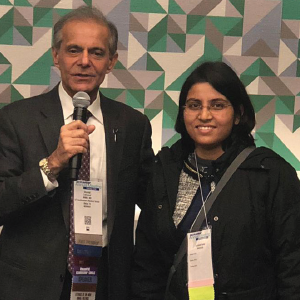
Dr. Sinha with Dr. Lakhanpal (left) at the IRA Reception during the 2018 ACR/ARHP Annual Meeting.
I culminated my time in Chicago at the 2018 ACR/ARHP Annual Meeting. This was my first time participating in this conference, and the level of intellectual exchange and collaboration was inspiring. I particularly enjoyed the concept of the fellows-in-training pre-conference session on the Friday before the full meeting began. It celebrated fellows working in the field of rheumatology from all around the world, and provided insights and interaction with peers, as well as leaders in the rheumatology world. It was a proud moment for me to be part of the program. It was also a great feeling to be honored by Sharad Lakhanpal, MBBS, MD, the 2017 ACR president, and David Daikh, MD, PhD, the 2018 ACR president, at the IRA Reception during the ACR/ARHP Annual Meeting.
Given my interest in pediatric rheumatology, I had submitted a poster on the assessment of treatment responses, with special reference to remission using juvenile arthritis disease activity scores (JADAS) in the different categories of juvenile idiopathic arthritis and was able to present my research to the ACR community at the international meeting. This gave me the opportunity to exchange ideas that will allow me to expand my project.
Getting to hear from the experts and learning about their perspectives on the way forward in immunology and rheumatology was enriching. The sheer volume of sessions and opportunities for learning was expansive, and I only wish I could have simultaneously attended many of the informative and innovative sessions.
